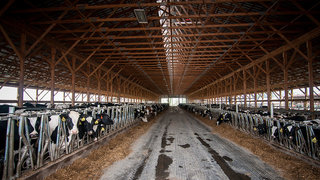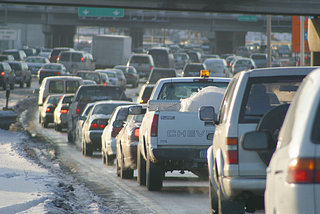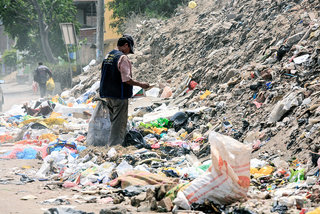Finn, please take a few sentences to introduce yourself.
I am Finn and I work for a consultancy called ThoughtWorks. I am specialised in all aspects of building a high quality product. I analyse software as much as the team composition, the established processes, the business and data around it. With this heuristic approach I consult the ThoughtWorks teams themselves.
 Finn, I know that you are vegetarian and concerned with preserving the environment. Why does that matter to you?
Finn, I know that you are vegetarian and concerned with preserving the environment. Why does that matter to you?I am a sensible human being. Plus - and this is probably the differentiation - I do not close my eyes to what is going on in the world. I became vegetarian after thinking about where the meat that I was consuming (daily!) really came from. I ignored what marketing told me, and tried to be smarter than blindly believing what I saw in the supermarket. If you are really aware of how much suffering you inflict for you convenience, how would that not change your behaviour? It changed mine.
Years later, investigating more on the topic, I found out that it’s not only about meat. The entire animal farming industry is the root cause for a huge part of our CO2 emissions. Nothing in my private life has a bigger impact on the world's climate than having a vegan diet. I have no idea how people can get up in the morning being aware that with most of what they do over the day destroys the chemical composition of the atmosphere of our planet. So I guess they are not aware. And this is the main difference. It matters to all people, not just me.
What do you actually do regarding these things?
We are right now changing the chemical composition of our atmosphere and destroy our planet we live on. We are very close to a tipping point where the climate may change very fast. We have to stop this madness right now. And there is something everyone can do easily.
The CO2-Footprint of the beef of one burger is about equal to driving 100km by car. I neither eat meat nor drive a car. I organise film screenings about climate justice topics and I am in exchange with people from Ecuador, the US, Australia, China, India and more countries to think how we cannot only impact our private lives, but also our work environment.
What do you consider the biggest challenge (for humanity) of our times?
Again climate change. The poorest areas of the world already suffer the most. Syria experiences the driest times in history. Central Africa, too. They are already hotspots of wars and uprisings today. And we really wonder why so many refugees come from exactly those areas? There are fights between citizens and police in Mexico, because the people have no more access to fresh water. The arctic is melting at an incredible speed. While I love sailing, I would not enjoy sailing over the north pole in a couple of years.
What could we do to engage in these topics? For example, did you take part in public protests, donate money to NGOs or sign petitions?
I think the best thing one can always do is to lead by example. It is difficult to just sent some money somewhere. There are programs where you can donate money based on the miles you flew by plane to counterbalance your CO2 footprint. But studies showed that the people fly more when they use such services. They do not have a bad conscious any more, they pay to be free, and fly more.
 I would like to see more impact on these important topics of my regular work by just working on "the right things". Do you think that is possible in general?
I would like to see more impact on these important topics of my regular work by just working on "the right things". Do you think that is possible in general?No. If everyone does this our economy and lifestyle breaks down. This is not sustainable. Many people need to work so that we have the money that some can do "the right things". This is the basic idea of any social system. So the setting is there, but the balance is wrong: e.g. broker (who do not create value in the economy) earn up to 100 times more than people in child care. IT people earn 10 times more than activists working for NGOs. We have to balance that better than we did before. But it’s unreasonable to think that we will all just work for social justice issues.
There are many decisions we take before and during a project. Which choices do you think are relevant? (The recent VW scandal is an example. Developers could have chosen not to commit fraud.)
I think that this sounds easier than it really is. Imagine that you are together with 200 developers at VW. And all 200 seem OK with tweaking the software a bit. The reasoning - everyone else does it, too - seems just OK and so you go along. What is the alternative? Stand up against 200 colleagues? It is rare to find so very, very courageous people. If this discussion is going on it’s too late already. There is little you can influence as an individual in a large group. The least you can do is to refuse to do it. Someone else will do it, but at least it was not you.
I believe that we all as individuals should work on a culture where such a discussion does not even start. If 200 people would not even consider an idea to manipulate their software, then no one dare to ask. If we build software "properly", we build it secure and with high quality. Both characteristics oppose fraud. I think here a positive attitude towards the (real) product you are building goes hand-in-hand with a guidance to what is right. One should never blindly code, like a code monkey.
How do you think about selecting industry, customer and project based on your values and social responsibility?
This is really difficult! There is something "bad" to find about almost any company. Twitter and Facebook create the little interests-spheres. Amazon tries to make us buy more than we want (and more than some people can actually afford). Uber replaces long-lived taxi companies. Amnesty International does only oppose small third world countries. But what do they do about big companies that are even worse than some small nations? Did Amnesty ever raise issues about Google and their mass-surveillance? No.
Do you have problems with any industries? Why? What about Porn industry or weapon manufacturing?
So while I think there is not "the" company to work for there are definitely some not to work for: companies earning money in tobacco, oil, porn or weapon industry are not worth looking at. They do actually nothing to improve our world.
I think I can work in the finance sector or insurance. Usually, those clients pay well. And this money can then be used for a better course, like helping programs that are working on the social justice mission.
 Did you ever reject a customer or an actual project, that would bring you money based on your values?
Did you ever reject a customer or an actual project, that would bring you money based on your values?No. But I never had a client or project that was totally aligned with my values either. As I explained above: while there is no perfectly aligned company, I never join or reply to offers, that do not fit with my values.
On the other hand, what would be industries, customers and projects that you would love to work on?
I am lucky to work for a company that shares some of my values, especially about social and economic justice. ThoughtWorks just released an open source hospital system that was built together with doctors in India. It is now being rolled out in Pakistan and Bangladesh. There were some developers working on it, so my part was simply to ensure we have the money to do so, e.g. by joining "any" project in Germany.
If I could choose freely, I think I would either go into the automotive industry or renewable technologies. Why automotive? We are at the brink of electro mobility. But our old, rusty German companies move really slow in this direction. I would love to help them get up to speed and get rid of their 130 years old model of explosion-driven-vehicles. A society that is mostly vegetarian and bases on electro mobility is be something I would be proud to be a part of.
Thank you
Thank you, too!















